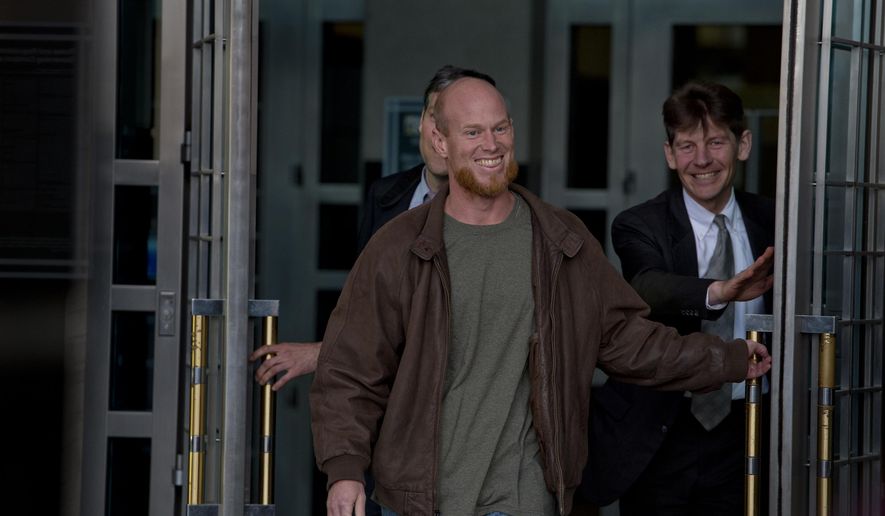SAN FRANCISCO — A Northern California man described by federal officials as an anarchist and eco-terrorist intent on blowing up government and commercial buildings was set free after nine years in prison when the government conceded that evidence in the case was never turned over to his defense attorney.
U.S. District Judge Morrison C. England Jr. in Sacramento ordered Eric Taylor McDavid released from custody Thursday. As part of a deal with prosecutors, McDavid, 37, pleaded guilty to conspiring to destroy a U.S. Forest Service lab in Placerville, California, and was sentenced to time served.
England expressed exasperation at the government’s failure to turn over the evidence, which included emails and a letter from McDavid to an FBI informant that defense attorneys said would have bolstered their argument that he was entrapped and induced by sex.
“I sat through the 10-day trial of Mr. McDavid,” England said, sometimes stopping to hold his head in his left hand, according to the Sacramento Bee. “I know he’s not necessarily a choirboy, but he doesn’t deserve to go through this, either. It’s not fair.”
McDavid and two co-defendants were initially accused of plotting to bomb or set fire to the Nimbus Dam, the U.S. Forest Service lab and cellphone towers and electric power stations. Authorities said McDavid conducted surveillance at two of the sites and brought materials to make an explosive device.
He was convicted in 2007 and sentenced to 20 years in prison. The conspiracy count he pleaded to on Thursday would have earned him a much shorter prison sentence of as much as five years.
McDavid’s supporters said the FBI informant - an unnamed woman referred to in court documents as “Anna” - urged him to attack government targets with promises of sex.
“Anna stoked Mr. McDavid’s romantic interest in her and conditioned sexual fulfillment on completion of the mission first,” McDavid’s attorneys wrote in a court filing.
The documents that were withheld also included a request that the informant undergo a polygraph test - a request the defense said raised questions about her credibility. McDavid became aware of them after his supporters filed a Freedom of Information Act request.
“If the government had provided the missing information as they should have, Eric would not have been convicted and had nine years of his life stolen by the U.S. government,” Ben Rosenfeld, one of McDavid’s attorneys, said Friday. “Who is going to answer for that?”
Prosecutors counter that the failure to disclose the emails and letter was inadvertent, and they were released promptly after their discovery following the Freedom of Information request. But they say the documents do not clear McDavid of the crime, as evidenced by his guilty plea on Thursday.
“We absolutely admit that we made a mistake, but there was no deliberate, knowing withholding of any documents,” First Assistant U.S. Attorney Philip A. Ferrari said.
“They don’t change our opinion that he’s still guilty of the offense, that the jury would have rejected the defense as it did the first time around,” he said.
The U.S. Attorney’s Office entered into a plea deal with McDavid in light of the significant sentence he had already served and the expense of a possible retrial, it said.
Prosecutors are obligated to ask for all of the evidence in a case, but it is not unusual for some documents to slip through, legal experts said.
“I’ve never been involved in a case that had any degree of complexity that didn’t have stray documents laying around,” said Rory Little, a former federal prosecutor who now teaches at the University of California, Hastings College of the Law in San Francisco.
David Shapiro, another former federal prosecutor now working as a private attorney, said failure to disclose information alone would not derail a case. Appellate courts ask whether the material would have changed the outcome of the trial.
In court, the government said the documents had been held in an FBI file in Sacramento, according to the Bee. The prosecutors who worked on the case were not aware of them, and it was not clear why they hadn’t been turned over, Ferrari said.
“In terms of where it broke down here and what happened, we just don’t have a specific answer,” he said. “We just don’t know.”
The FBI did not immediately have comment on the case.
McDavid emerged from the federal building Thursday afternoon and fell into the arms of his parents, George and Eileen McDavid; his sister Sarah; and his girlfriend, Jenny Esquivel, according to the Bee.
Rosenfeld said he did not want to talk to the media.




Please read our comment policy before commenting.